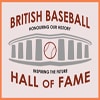I’d like to teach the world to swing (a baseball bat)
 Each year, as Joe Gray pointed out in an article a couple of years ago about the health of British baseball, essentially no one will know which teams will be competing until around mid-March.
Each year, as Joe Gray pointed out in an article a couple of years ago about the health of British baseball, essentially no one will know which teams will be competing until around mid-March.
Registration has traditionally been extended because clubs are poor at getting their forms in and fees are periodically overdue and often only paid if it means one of the teams wouldn’t be eligible for post-season play.
This year 51 teams registered and 49 will finish the season, maybe even only 48. The Menwith Hill Patriots pulled out mid-season, the Windsor Bears merged with the Bracknell Inferno (second-team) to form the Windsor & Bracknell Bears and there are rumours that Mildenhall Bulldogs may also have played for the last time, if not forever then at least this season, having last competed on July 24th.
It’s a sad sight: the Bulldogs and Patriots – 1995, 1996 and 1998 national champions – each have oodles of experience, while the Windsor Bears are former NBL champions (2003). But the Windsor club still remains in part, so at least not everything is lost.
The teams that we need to look for in hard times are few and far between. While youth programmes have been great at getting new players to fill the rosters, it is a club like the Guildford Mavericks who recently lead the way in player recruitment and retention. And the health of their numbers is reflected in the health of their performance; after winning the single-A title in 2010, the club added another team who narrowly missed out on the playoffs, while the first team will head into the AA playoffs with every chance of success.
And then we get clubs like the Brighton Buccaneers. Perennial challengers for post-season success during their time in the NBL in the early part of this century, the Buccaneers inexplicably folded in 2006/07, and though the Horsham Hornets still play at the Pavilion Field, it’s another disappointing example of what happens when clubs don’t have good structures in place.
Across the UK there are stories of what happens when people leave an area and no one wants to step up to take responsibility. In Hull and Humberside they used to have an entire league; in Essex, though baseball is still strong, there have been a succession of new clubs that start and finish within a few seasons of one another.
There are two inherent risks with expansion: it means that the league will likely be initially weaker while the new club finds its feet (although this season has proven an anomaly with the Lakenheath Diamondbacks, Southern Nationals, Cambridge Royals and Nottingham Rebels defying the odds), and it means players from other teams will leave, and often on bad terms. Which means no one feels as though they can go back if the new project folds.
There’s a new club forming in the north east of England (Newton Aycliffe Spartans) for 2012, and everyone in the area is hoping it succeeds: there’s a new spot in the division with the Patriots’ demise, and there hasn’t been a baseball team in the north east for at least four seasons.
Added to that there are three clubs who’ll enter the league in the south west (Torbay Barons, Plymouth Mariners and Bristol Bats), making the most of the fledgling Plymouth youth programme. Of the big towns in the UK that don’t have clubs, there’s no representation from Wales or Scotland, only two clubs in Yorkshire/Humberside and, as mentioned, no senior baseball team in Brighton.
Currently this equates to less than 1 in every 100,000 people in the UK playing baseball. Contrast that to cricket, where around 1 in every 400 people in Britain plays, and even softball, where around 1 in every 30,000 play (very rough figures), and we can see areas where player recruitment could come from. Many who play baseball double up on other sports as well, some of which have relevant skills (e.g. cricket, softball, golf, hockey), so the potential to encourage our colleagues and friends to join us on the diamond is massive. If we want the sport to grow, we need to get it done. And we need to keep them playing.
Even if they don’t play for your team, it’s better they play baseball than not at all.
Picture courtesy of mister-baseball.com
